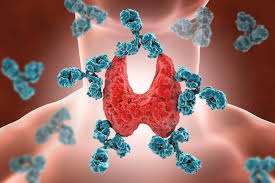Thyroiditis is a rare, life-threatening autoimmune condition. Hashimoto’s illness, chronic lymphocytic thyroiditis, and autoimmune thyroiditis are additional names for Hashimoto’s Thyroiditis.
The immune system starts attacking the thyroid because it no longer recognizes it as a healthy part of the body. This results in the inflammation of the thyroid gland, known as Hashimoto’s Thyroiditis. The attack of the thyroid limits its production of thyroid hormones thereby resulting in hypothyroidism (underactive thyroid) and goitre.
Hashimoto’s Thyroiditis is not curable but can be managed effectively with the proper medication.
The exact reason for the malfunctioning of the immune system is unknown. Meanwhile, the risk factors are gender (being a woman), age (between ages 30 and 50), family history, pre-existing autoimmune condition, pregnancy, radiation exposure and excessive iodine intake.
Certain foods can trigger the occurrence of Hashimoto’s Thyroiditis. They are gluten, added sugar, fast-food, artificial food colouring, refined grains, highly processed foods and alcohol. Meanwhile, foods like eggplant, peppers, potatoes and tomatoes are recommended for people with Hashimoto’s Thyroiditis.
The symptoms of Hashimoto’s Thyroiditis are not usually detected. But in serious cases, swelling in the thyroid gland, fatigue, weight gain, cold feeling, sleepiness, constipation, puffy face, joint stiffness, muscle weakness, dry skin, hair loss, brittle nails, depression, irregular menstrual bleeding and enlarged tongue can be noticed.
Complications of Hashimoto’s Thyroiditis are Addison’s disease, Graves’ disease, type 1 diabetes, lupus, rheumatoid arthritis, thyroid lymphoma, mental health issues, heart problems and reproductory dysfunction.
The laboratory diagnosis of Hashimoto’s Thyroiditis is by Thyroid Function Tests which includes the Thyroid Stimulating Hormone (TSH), Antithyroid Antibodies Test and Free T4 Test.
Hashimoto’s thyroiditis can be treated with Thyroid Hormone Replacement Therapy.
Visit MedBioTech for accurate Thyroid Function Tests. This will help in the early detection of Hashimoto’s Thyroiditis.
References:
www.endocrineweb.com
www.mayoclinic.org

